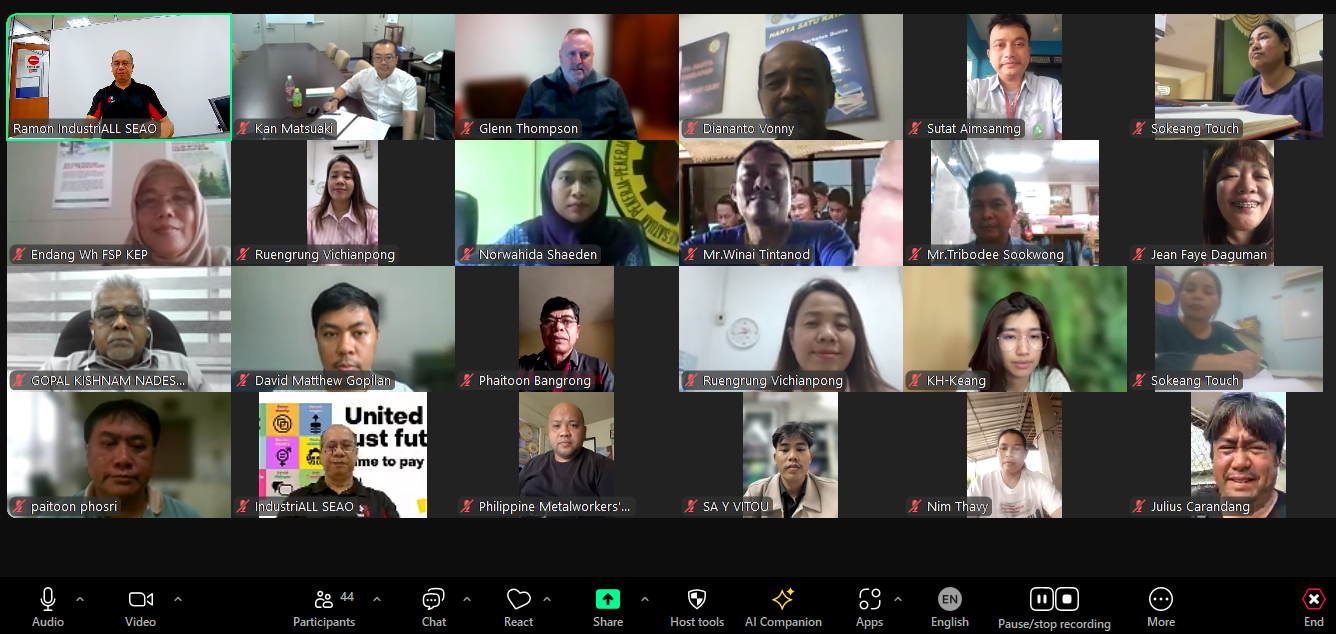30 July, 2024On 26 July, Southeast Asia unions met to discuss the impact of Industry 4.0 and artificial intelligence (AI), they committed to protect workers’ rights as the world of work enters a period of uncertainty.
The OECD Employment Outlook 2023 reported that AI might cause a decrease of 14 million jobs, with a quarter of jobs expected to change. Workers in the manufacturing and finance sectors are particularly concerned about job security.
While companies are integrating AI to enhance productivity, around 69 per cent of trade unions do not have AI provisions in their collective bargaining agreements. The use of AI to collect workers' data could also exacerbate discrimination, threaten privacy, and interfere with freedom of association.
IndustriALL Global Union assistant general secretary Kan Matsuzaki emphasized the need for trade unions to manage new technology, ensuring workers face minimal risk and benefit from the transformation. He stressed the importance of transparency from companies regarding the introduction of new technologies.
"Through social dialogue, workers should receive proper education on new technology. We must negotiate beforehand so employers cannot simply introduce new technology and dismiss workers if they cannot catch up. Singapore's company training committee is a good example of managing industry transformation,"
Matsuzaki added.
IndustriALL has established an Industry 4.0 expert group to develop a policy paper on digitalization, AI, and Industry 4.0 by November 2024. The main principles include:
- demanding full participation of workers at all levels in Industry 4.0 discussions,
- protecting human and workers’ rights, and
- ensuring a just transition for workers and their families.
During the virtual IndustriALL regional meeting on Industry 4.0, 40 trade unionists from Australia, Cambodia, Indonesia, Korea, Malaysia, the Philippines, and Thailand shared their views on industry transformation in the region.
It was suggested that trade unions lobby members of parliament to enact laws related to Industry 4.0 and AI. Governments must regulate the widespread use of robots in Chinese electric vehicle facilities in the region. Trade unionists called for comprehensive Just Transition provisions in collective agreements to preempt the replacement of workers by robots.
"Unlike Japanese automotive companies in Thailand that use 80 per cent workforce and 20 per cent robots, Chinese electric vehicle plants use only 20 per cent workforce. This practice does not benefit workers and has serious consequences for downstream auto part suppliers. We must protect job security through industrial policies and collective agreements,"
said Winai Tintanod, vice president of the Confederation of Thai Electrical Appliances, Electronic Automobile & Metalworkers (TEAM).
“Unions must adapt to these technological changes to safeguard workers' rights, ensure decent working conditions, and promote sustainable economic growth. Our collective future depends on safeguarding the dignity and livelihoods of every worker in this digitalized economy,”
said Ramon Certeza, regional secretary of IndustriALL South East Asia.
